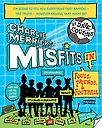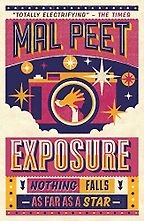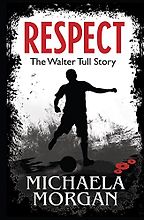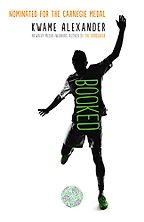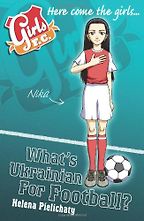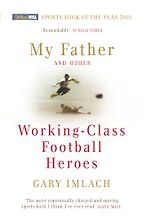First of all, and quite aptly, my daughter wants to know if you are as football obsessed as your character, Charlie Merrick?
Football has always been a huge part of my life. I grew up in Birmingham, and I’m a Birmingham City fan. I had no choice in that. I was born into it. My dad was a Blues fan. His dad was. So, there wasn’t any question. It was just a part of me, and I suppose it’s always been that way.
As a kid I wouldn’t even use claret and light blue colouring pens because they were Villa colours: that is how serious football was to us then. I was obsessed. When I wasn’t down in the park playing football with my mates I would be drawing football pictures – because I love drawing as well. I was always drawing football, I’d draw entire games…
Like Charlie Merrick.
Yes, definitely. The thing is that you don’t always realize how much of yourself is in a character until somebody points it out. Now, I read that opening bit of Charlie Merrick, and I’m like, ‘Oh, yeah. That’s me!’
So, yes, to answer your daughter’s question, I certainly was as a kid. I think as you get older . . . I suppose you try to pull away a little bit. And yet on match days I go down there. I’m in the stands, and there’s this emotion. It really matters, and it’s crazy. I’m not particularly sporty. I’m not a sport fan in general, I just love football. I’m watching the World Cup at the moment and I’m really enjoying that, but I’m not one of those people who will just watch whatever’s on. Unfortunately, for me it’s all about the pain of following Birmingham City.
In your books, certainly in the Charlie Merrick series, football is a big theme, but these are also stories about friendship and growing up.
Friendship and growing up is something we can all relate to, and struggle with at times. Stories are all about helping us try to make sense of this crazy rollercoaster we call life. Football provides a great stage – a dramatic backdrop for this.
Apart from being a fan why do you think football is such a great background for kids books?
There are two things there. Going back to football itself, the thing that occurs to me is – why do I care? Why do I go and spend my money and my time on this game? Part of it is being in a stadium with thousands of other people and feeling that electricity in the air – feeling a part of something, and having something beyond the day-to-day existence. Which I suppose is where football originally came from, isn’t it? That’s why they have it on a Saturday afternoon at the end of the working week. You could go to a match and relax with your work mates – it was entertainment that was also a key part of the local community.
“Stories are all about helping us try to make sense of this crazy rollercoaster we call life. Football provides a great stage – a dramatic backdrop for this”
Plus, there are so many parallels with storytelling and football. You’ve got heroes and villains. You’ve got those David and Goliath battles. There’s a quest – a trophy to be won. An adversary, a time limit with a rising arc of tension as your heroes constantly try and fail, a moment when you think all is lost — which happens a lot with my team. One of the things that’s great about football is when the underdog triumphs.
And after they’ve read your books those kids can go and have a kick about in the park and play out the characters and stories. I know my daughter’s friends have done that.
My experience of playing football was that most kids are never going to make it as professionals. But they still love it, and they like going down to the park for a kick-about. I wanted to write a book about kids like that. When you’re at the park – in your head you’re Harry Kane or Alex Scott, but when you get the ball, maybe not so much! But that’s OK. It’s about the fun of playing the game with a bunch of mates.
I’ve realised that none of the books I’ve chosen to talk about are just about football. They’re all about other aspects of life that are familiar to all of us, and I think that shows how much football is a part of life in kind of a bigger sense: that old cliché, that football isn’t ‘just a game’.
And it’s not just a game for boys.
Of course not. It’s great to see how the women’s game is developing now, and how many girls play football at school.
My nan was a Wolves fan, and she used to go to games in the 1930s and 40s. She and her friends used to go and watch Billy Wright. She was a huge football fan. I think she was definitely one of my influences in becoming a fan. My other nan supported Manchester United. My grandad refused to go with her to matches because she’d get so passionate about it and get into arguments with other supporters. But huge passion for football – both of them.
Should we have a look at your book choices now?
I’ll start with the Mal Peet. Mal Peet is one of my favourite authors. I just love his stuff.
He’s written three football books, Keeper, Penalty and Exposure, and it was quite difficult choosing which one to talk about here. But when I started re-reading Exposure again it floored me. I’d forgotten how great it was.
It’s a story about a professional footballer who’s black and marries a white pop singer. It tackles big subjects like racism, social inequality and fame – real life issues.
I talk to kids in schools and I’m struck particularly by the way they can access the media these days. They’re always talking about Trump and whatever else happens to be in the news, and you kind of detect there’s an anxiety there about the world. They’re less protected from that than kids were when I was growing up, and I think books – like Exposure – are a great place to discuss difficult subjects in a very measured way.
“It tackles big subjects like racism, social inequality and fame – real life issues”
It also explores celebrity and the cost of fame. We live in such a celebrity-obsessed world. A lot of young people I meet talk about their ambitions, and some of them just want to be “famous”. I think this book raises interesting questions about that kind of desire. At the same time it’s simply a great story – a real page turner. Once you start reading it you can’t stop.
Which book would you like to talk about next?
Respect! The Walter Tull Story by Michaela Morgan. This is a Barrington Stoke book, it’s a very quick read, and a very good read.
Barrington Stoke is a publisher that focuses on dyslexic and under-confident readers. They’re produced on unbleached paper to make it easier for dyslexic readers. The stories themselves are sophisticated so that the readers get a satisfying and challenging read that is pitched at their emotional level. But they are also short so that the reader won’t be intimidated.
There are a lot of different readers out there, and talking to librarians and going to schools I meet students who are less confident readers for a number of reasons. If you feel you’re not very good at something, or struggle with something, you’re going to run a mile from it. Reading about a subject like football, that you love, is a great way to get over some of those barriers and get into books.
Respect touches on big issues: racism, war, bullying, and is written in a conversational tone, so if you’re not that confident you haven’t got to struggle with the formality of language. It’s almost like the book is talking to you.
I chose it because as a football fan the Walter Tull story is a really important one. It’s shocking to me that so few people know who he was, and why he was important, especially when you think about how famous footballers are these days.
If you want a real football hero, look at this guy. He overcame incredible adversity and deprivation to become the first black professional football player. For a while he suffered so much racist abuse he almost stopped playing. But he didn’t. He kept going and paved the way for others to follow. Then, during the First World War he became the first black officer in the British Army commanding white troops. There was an army rule at the time saying that black men couldn’t be officers, and the British Army actually changed it so they could make Walter Tull an officer – which is tribute to just how exceptional a person he was.
If it hadn’t been for Walter Tull and people like him then, how much longer would it have taken for football to become integrated? There’s still a long way to go of course, but he started it. I wish every football fan knew about this guy because he’s really important – a real hero.
Your third choice is Booked by Kwame Alexander.
This is one of those books I became aware of through chatting with librarians on Twitter and Instagram. If somebody recommends a book to me I find that their enthusiasm for the story always means more to me than any blurb or a publisher’s spiel. I love school librarians – they are at the front line, they know what kids are actually reading. They are the superheroes of the industry, really.
Sign up here for our newsletter featuring the best children’s
and young adult books, as recommended by authors, teachers, librarians and,
of course, kids.
I also chose this one because it’s written in free verse, which means you are not overwhelmed by pages filled with text. Obviously, some readers might hate poetry, but it’s free verse which is a bit different.
I hope kids won’t be put off, because as soon as you start reading, you almost forget you’re reading poetry – you just get caught up in the characters and the story. I love the economy of language that you get with poetry, how a few carefully chosen words can capture the essence of a moment.
I think this is well-pitched too. Writing for teenagers and young people is difficult because you have to be very careful you don’t come across like someone’s dad, someone trying too hard to do the teen speak. And cultural references change so quickly. But I think Kwame Alexander really nailed it with this. It feels authentic and modern. There’s some great bits of humour in there, and again this isn’t just a story about football – the main character’s family are breaking up, and he’s struggling to deal with that too.
“For me, and for a lot of people I think, football is a lot to do with family. ”
As the title suggests, Booked is full of clever word play and it’s very subtle. The author puts in all these fantastic words, so you learn stuff, but almost by accident. I really enjoyed it, and it’s one of those books that I think teenagers will enjoy. A lot of books are recommended for young people, and sometimes you read them and think, ‘Yeah, that’s a really good book, but I’m not sure how many of the target audience are really going to be able to relate to it.’ This one has hit the mark.
Your fourth choice is one of a series of books about a girls’ football team, Girls FC by Helena Pielichaty.
And I must point out I’m not just picking this because I wanted to put something in here for girls who like football! These books are really good. Having said that, a lot of girls are playing football and are huge fans of football, and probably the majority of literature out there about football isn’t representative of women’s sport. I think there is a huge gap there, and it needs to be addressed.
I would have loved this when I was a kid – a whole series about one team! The book I’ve chosen out of the series is What’s Ukrainian For Football?, and again, first and foremost, it’s a really good story. It draws on so many different things – friendship, identity, history – as well as football.
Basically, it’s about a Ukrainian girl, Nika, who’s moved to the UK and is playing for an under 11s team. Joining the team is part of the way that she adjusts to living in a new country, but she still feels different, and she’s very aware of that. When her team are invited to go and play in a celebration of the World Cup, this sense of difference is brought home hugely. Her team are allotted Ukraine and many of them are really disappointed. They wanted to be England. Nika is very upset by their reaction.
Nika’s uncle tells her the famous “Death Match” story. A true story. Under Nazi occupation a Ukrainian team plays against a Nazi team. The Nazis warn them that they have to lose the match, but the Ukrainian team decides to try and win regardless of the price they eventually have to pay.
Nika is inspired by the heroism of those players and uses the story to rally her team. It works really well. It’s very subtly done and beautifully written.
Your last choice is a non-fiction book, My Father and Other Working Class Football Heroes by Gary Imlach
This is a book I’d like every football fan to read! I bought copies for some of my friends I was so keen for them to read it! It harks back to a time before six figure salaries, when players travelled to matches on the same bus as the fans; when players had other jobs, and when football was about the football. Sometimes I feel a little bit ashamed of where football is at the moment.
It wasn’t perfect back then either, of course, and this book is partly about that period of change. Players were badly treated in the past and this mistreatment sparked the change that has got us where we are today. It’s very nostalgic, but it captures elements of the game that really mean something to me. The title, for instance. For me, and for a lot of people I think, football is a lot to do with family. Part of the fun for my lad is seeing his grandparents at the matches. That’s one of the things I think is good about football. Most of all though, this book oozes a love of the game.
Interview by Zoe Greaves
June 27, 2018. Updated: September 16, 2023
Five Books aims to keep its book recommendations and interviews up to date. If you are the interviewee and would like to update your choice of books (or even just what you say about them) please email us at [email protected]
Five Books interviews are expensive to produce. If you've enjoyed this interview, please support us by donating a small amount.

